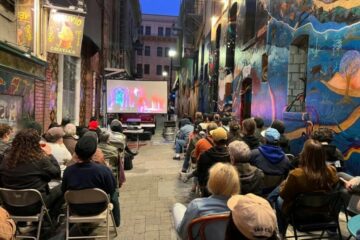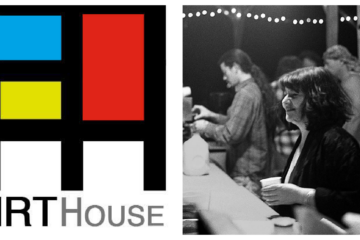The City That Was: Vanity Fair
In The City That Was, Bohemian Archivist P Segal tells a weekly story of what you all missed: the days when artists, writers, musicians, and unemployed visionaries were playing hard in the city’s streets and paying the rent working part time.
Vanity Fair, Where Work Was Funny
One day at the Savoy Tivoli, I was telling my friend Lin Haley that the checks for everything I’d written in the months before seemed to be lost in the mail and I really needed some instant cash. She said the restaurant she worked at, Vanity Fair, conveniently needed a hostess. It was perfect: about 3 to 4 hours a day, and cash in hand at the end of every shift. Since Lin was an adored staff member, her recommendation got me in.
Vanity Fair was on the second floor of one of the Embarcadero Center buildings. It was half bookstore and half French café. For people who loved to read, it was a great place to escape the engulfing financial district. You could take a book to your table to read over lunch and buy it or not, even if you’d managed to dribble your potage on it.
My first day on the job, I met my co-workers. Two of the other waiters, Frank Prinzi and Milt Abel, were trying to become comedians, as was the busboy, Larry Bubbles Brown. Bobcat Goldthwait also worked there, shortly before I did. In fact, they all became professional comedians. At that early stage of their careers, they practiced on Lin and me. They’d come up with a joke, and stop us, mid-delivery of someone’s meal or adding up someone’s check, to try it out. If we didn’t crack a smile, they’d keep at the same gag for weeks, changing the wording, adding something, altering the delivery, until, eventually, it made us laugh. Sometimes we just laughed at their dogged persistence, but whatever. Laughing is always good.
They’d each have perfected at least one joke a week, so we always got at least one good laugh a shift. In spite of their wit, and the ongoing hilarity, aspiring comedians are pretty much universally depressed people. Realizing you want to be a comedian is terrifying, since it’s as common in job listings as calls for poets. You’re good at it, or you’re not, and to find out if you’re good, you have to stand up in front of a bunch of strangers and try it out, which is scary as hell. Still, you could work part time at Vanity Fair and have a good eight hours a day to turn your neuroses into gag lines.
The chef, Bobby Aridas, was actually as funny as anyone in the place. Perhaps that’s because he wasn’t under any professional obligation to amuse, and he could just be silly. Or maybe it was the fattie he smoked under the hood to start his shift. The lunch chef before him was Gary Danko.
On the whole it was the greatest job ever. The owner, Paul Stanners, obviously had a soft spot for funny people and good books: my ideal sort of employer, and the kind I have yet to find again (unless you count Broke-Ass Stuart, who isn’t exactly my employer). Work was so entertaining that days off were less attractive than going to work. That usually only happens when you have a crush on a colleague.
Vanity Fair was too good to last. Eventually, Paul Stanners sold the place to a mad Russian immigrant named Zol, who looked like the kind of person searching for a way to legitimize his business interests. Zol kept the staff, but he had no interest whatsoever in humor or literature. In fact, the book half of the place soon began disappearing, along with half the clientele, who came because there were books.
Zol assumed that business was dragging because the staff wasn’t aggressive enough, and he started yelling at us to sell more. One day, Zol cornered me and bellowed, “WHY DIDN’T YOU SELL THAT PERSON DESSERT? YOU ARE COSTING ME MONEY!! YOU ARE WORTHLESS!!!”
I was in the process of putting a few more dollars onto my tip tray while his blood pressure was rising dangerously. He kept yelling, and I fingered the tip tray, enjoying the fact that everyone in the dining room could hear him being an asshole. When I’d had quite enough employer abuse, I flung the tray—and almost forty bucks— at his face, and went back to the preferable uncertainty of freelance writing.
Embarcadero Center may be newish, but there are things about it that are beautiful, and the holiday lighting is great. This lovely photo was purloined from sfxplorer.com.










